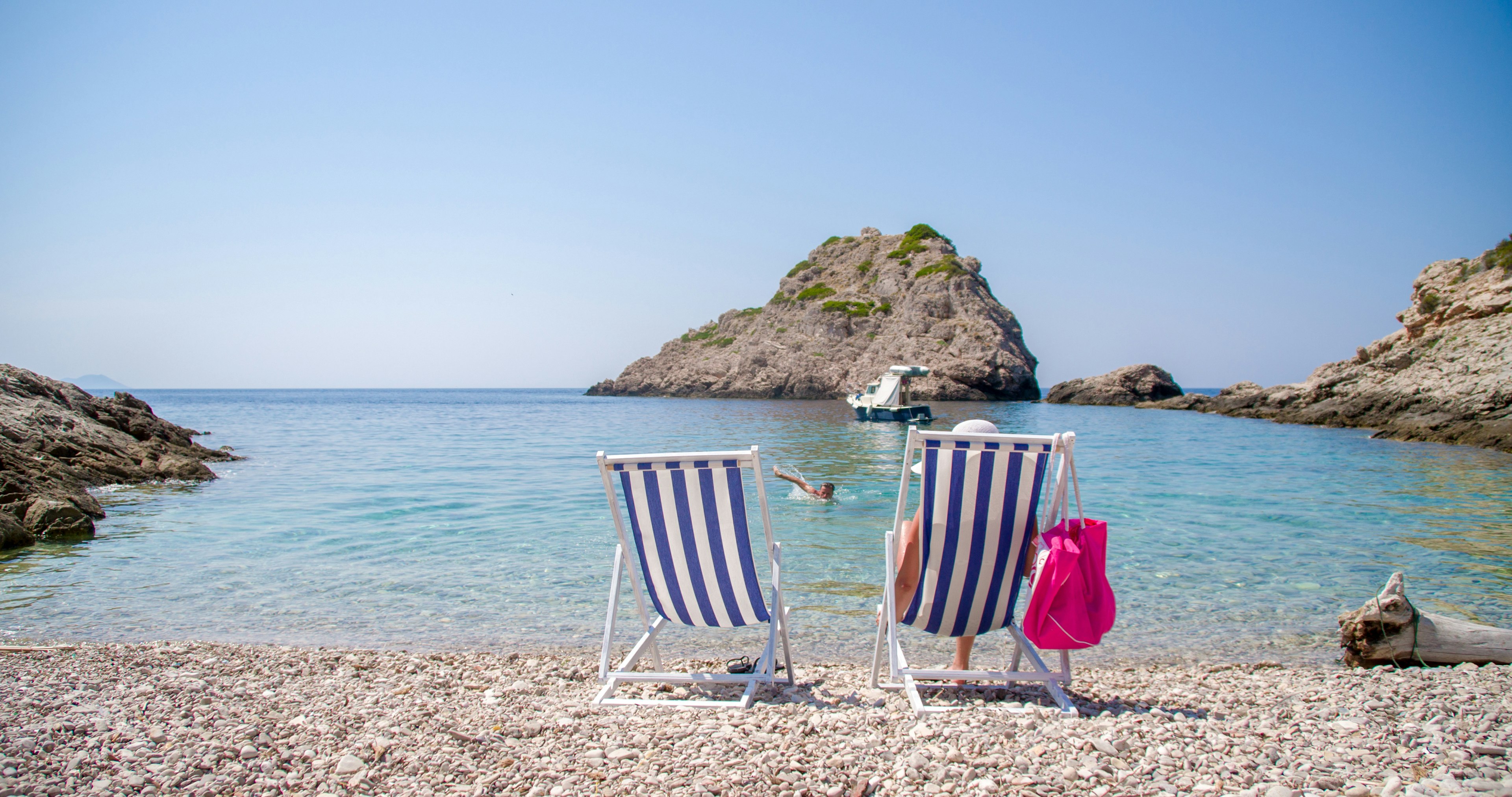
Lonely Plan-it: how to plan a Croatian island-hopping adventure

Feb 7, 2023 • 7 min read

With a bit of planning, you can get the most out of a jaunt across Croatia’s staggeringly beautiful islands © Getty Images/ iStockphoto
In Lonely Plan-it, we take you step by step through how we planned some of the most complicated travel adventures, so you can recreate them yourself with ease. Here, writer Lucie Grace shares how to put together the perfect Croatian island-hopping trip.
When I moved to Croatia, I was aware of length of the country and its sprawling coastline. But the number of islands and islets here? That came as a surprise.
“More than 1200” is definitely not the answer I would have guessed. So after arriving, I decided to leave my suitcases at my friend’s hostel in the leafy, laid-back capital of Zagreb and trundled off with just a backpack to see as many of the 48 inhabited islands as I could. I started with the Dalmatian Coast, keen to visit the most famous destinations and catch a glimpse of the dazzling Renaissance churches and baroque town halls before tourism bounced back.
I don’t drive a car – but since bus, train and ferry links in Croatia are cheap and efficient, reaching the islands is entirely doable without getting behind the wheel. And no matter how long the journey takes, once you dip your toes in the clear waters of the Adriatic, you’ll forget all about the bus you were just on.

The ultimate island-hopping trip does take a bit of planning, though – not only to home in on your must-see destinations, but also to research ferry schedules, off-season closures and local festivals. Accept that you’ll barely scratch the surface, put FOMO to bed and aim for the spots that appeal most: fewer is more in the island game.
Luckily, we’re here to demystify the process, with some helpful tips and practical pointers.
Step 1: Pick your loop
Decide whether to see the greatest hits or to visit lesser-known spots.
First things first: ask yourself if you’re committed to jumping between islands. If not, you can always do as the locals do and spend your vacation happily grazing and lazing on just one. Rustic Šolta, olive grove–dotted Ugljan or the rugged shores of Vis are great picks, all being idyllic yet easily accessible from mainland city ports.
Definitely keen to visit a few? Decide between doing a loop of the Dalmatian islands in the south or exploring the equally charming archipelago in the Kvarner Gulf to the north.

The classic Dalmatian-coast route employs ferries that start in Split and link Brač, Hvar, Korčula and Mljet, before ending in Dubrovnik (or the other way around, starting in Dubrovnik and ending in Split). It boasts popular islands like Hvar, while also ensuring you can see two of the country's top cities for travelers.
The Kvarner islands are ever-so-slightly less trodden, and include Krk, Cres, Lošinj, Pag and Rab, in the bay between the vibrant maritime cities of Rijeka and Zadar. This cluster is just as wonderful as the Dalmatian islands, if marginally less popular due to their lack of Game of Thrones cachet.
Regardless, all of Croatia’s islands have buckets of charm, with different traditions, foods and scenery.

Step 2: Find the right time of year
Ferry schedules vary by seasons, so find the time that works for you.
You’ve chosen your route? Now to select the best time to go. Spring and autumn are the perfect seasons to immerse yourself in local culture and gastronomy, when the climate is pleasant and ideal for sightseeing. Cyclists and hikers enjoy the fresh temperatures of these seasons too – they just require some extra organization as you’ll need to work around the irregular ferries.
The two main ferry services – Krilo and state-owned Jadrolina – start ramping up their daily services come May and June, adding ever-more service throughout the glorious summer months. But August is best dodged: as in Italy, Croatia subscribes to the tradition of closing the office for the month of August to relax on (you guessed it) an Adriatic island. This makes accommodation scarce and pricey, and adds traffic to otherwise quiet beach roads. Aside from August, summer is ideal for beach lovers; the konoba restaurants and guest houses are open, and there’s a swathe of festivals to add to your itinerary.

A few top local shindigs to have on your radar: the Easter weekend procession Za Križen (“Following the Cross’’) on Hvar; the Korčula Sword Dance Festival, performed from June to September; EDM fun at Hideout Festival on Pag in July; and the Brač Film Festival in August.
Finally, if you’re a committed off-peak traveler, it’s not impossible to cruise to a few islands in the winter, as a skeleton service of ferries does run to keep the islands connected. Just keep in mind that the winds are fierce and many businesses close during the off-season; I wouldn’t recommend visiting then unless you have a novel to write.
Step 3: Decide how many nights to spend on each island
Our advice: you're not going to want to rush on any of these amazing islands.
Now that you’ve pinpointed your region and time of year to visit, it’s time to pick the islands that provide the sort of experience you want from your holiday. Do you fancy wild, unspoiled beaches? Head to Cres. Roman ruins? It’s Hvar you’re after. Wine-tasting at rolling vineyards? Don’t miss Korčula. Dancing all night long? Pag is for you. And then there’s the most scenic beach in the country, the famous peninsula of Zlatni Rat, on Brač. I also rate Krk very highly, as I love to visit abandoned buildings: the seaside town of Malinska is home to the Haludovo Palace Hotel, a dilapidated modernist masterpiece (but since you’ll have to enter at your own risk, you didn’t hear that from me).
Once you’ve worked out whether you’re after rest and relaxation or all the food and culture you can get your hands on, decide how many days to spend on each island. The ferries may dictate the length of your sojourn, depending on the month you go; either way, don’t rush it. I definitely advise two nights minimum per stop – ideally three, to really relax into the pace of island life. No one wants to end a vacation more exhausted than they started it.

Step 4: Book your accommodation and transport
Spontaneity is great, but Croatian island-hopping benefits from some planning.
Finally, it’s time to get booking. I’d start the accommodation trawl a few months before you go so as to have your pick of the best places. It’s also smart to book your bus tickets a few weeks prior. Local bus service Arriva Croatia offers routes on the islands, with seats bookable up to 30 days in advance; you save 50% by buying as soon as they go on sale, with fares cheaper on the phone app than the website (download it in advance). I’d also advise booking ferry spots in advance. You’ll be fine booking the main routes a day or two before you set sail – but best not to chance it if you’re traveling outside the summer months when services are less frequent. If you’re taking the scenic train from Zagreb to Split or vice versa, that’s worth pre-booking, too, as it’s a small train and it fills up fast.
If I could do it all over again…
My next visit to a Croatian island or two (or 14) will certainly be less rushed, and I’ll plan to stay on each island for longer. One night on sleepy Cres is not enough; I’m still reminiscing over the smell of cypress trees and the light dancing on the crystal blue bays. I won’t be staying bang in the center of Hvar old town again, though: it’s the clubbing center of the Dalmatian islands, so not for you unless you want to party all night (if you do, then don’t miss it).
Pack your own food if you’re vegan; dietary requirements are catered to in big Croatian cities but less so on the islands. And of course, driving is much easier than relying on buses. I’ve since got my motorbike license – so I’ll be rolling along in 2023.
Explore related stories


 BeachesCroatia itineraries: 3 routes to explore the cities, coasts and interior
BeachesCroatia itineraries: 3 routes to explore the cities, coasts and interiorNov 8, 2024 • 6 min read






 Tips & AdviceMontenegro vs Albania: how to choose between two Balkan beachfront countries
Tips & AdviceMontenegro vs Albania: how to choose between two Balkan beachfront countriesOct 4, 2024 • 7 min read
